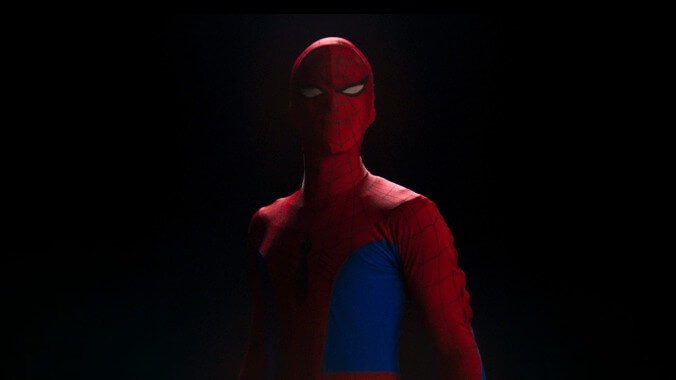The disjointed but devoted Marvel’s 616 highlights what truly makes Marvel great

On paper, Marvel’s 616 seems like it could be excruciating. It’s a Disney-backed documentary series, airing exclusively on Disney+, about the various fun and heartwarming behind-the-scenes stories of a Disney-owned media brand. The company already spends a lot of time and money pushing the idea that Walt Disney was a visionary genius who singlehandedly made the world a nicer and brighter place, and it would be pretty easy to just do the same thing but with Stan Lee and Steve Ditko and Jack Kirby, or even Jon Favreau and Robert Downey Jr. and Kevin Feige. It is a huge credit to the various people involved in this series, then, that Marvel’s 616 is not just several hours of needless mythologizing, but an engaging series that finds new angles from which to appreciate the Marvel universe. Lee and Ditko and Kirby get plenty of attention, but it’s not a show about how great they are. It’s not even a show about how great Marvel is. It’s a show about the people who make Marvel great, from kids putting on a Squirrel Girl play, to the people designing action figures, to the guy who played Japanese Spider-Man.
A lot of what makes Marvel’s 616 good is a format hook that could’ve easily gone off the rails. Every episode is directed by a different person, so they have very little structural or aesthetic similarities to each other. But rather than feeling too disjointed, the looseness of the series as a whole allows its best episodes to hit on little choices that stand out nicely because they’re not in every episode. The clearest example is in Gillian Jacobs’ episode, “Higher, Further, Faster,” which starts by being about women working at Marvel in the old days and casually lays in a little timeline of when certain characters were introduced or when certain people started at the company, which quietly foreshadows what it’s all building toward.
That something, if the title of the episode doesn’t tip you off, is the big Captain Marvel reboot spearheaded by Kelly Sue DeConnick, which took Marvel history and built on top of it in a way that brought a new level of respect to a female character who had been around for decades. But then Jacobs pulls a clever trick: The episode is not actually about Captain Marvel: It’s about Kamala Khan, a.k.a. Ms. Marvel, and how all the women working for Marvel paved the way for Marvel editor Sana Amanat to come along and co-create Kamala based on her own experiences, which ties back in with the timeline thing. See? Clever.
The lack of a uniform structure can be a little jarring, though—it’s worth noting that the title of the show is never explained, so anyone who doesn’t already know the significance of the number 616 to Marvel won’t get an answer from this. Paul Scheer’s episode, for instance, seems designed to be a standout, which kind of hurts it when taken in the context of more straightforward documentary episodes. Scheer’s episode, “Lost And Found,” is about his attempts to cash in on Marvel’s popularity with an animated series about obscure characters, and he turns it into sort of a meta-documentary about making a Marvel documentary. It’s funny, and Disney actually lets things get a little self-deprecating with a tossed-off Jon Favreau joke. But it might’ve played better as a standalone special rather than immediately preceding a perfectly nice (if otherwise pretty standard) episode about people coming out of their shells or expressing their identity through Marvel cosplay.
A lot of the episodes actually flirt with being “perfectly nice and otherwise pretty standard,” but most of them zero in on some particularly touching detail that actually does sell the idea that Marvel stuff means a whole lot to some people. The “Marvel Method” episode is the closest to what you might expect from this kind of series—focusing on longtime Spider-Man writer Dan Slott as he tries and tries to write the first issue of Iron Man 2020—but what keeps it from feeling generic is Slott himself, who is a delight. (Also, Superior Spider-Man was great and he doesn’t deserve the hate he got for it.)
Similarly, David Gelb’s episode about the Japanese Spider-Man TV show could have easily just been about how weird the series was and the wacky ways it differed from established Marvel canon to try to appeal to foreign audiences (Spidey has a giant robot Sphinx and got his powers from an alien). Instead, Gelb puts together a bunch of really sweet interviews with the people who worked on the show talking about how much fun it was even with no budget, particularly star Shinji Tōdō, who clearly loved playing Spider-Man and seems especially excited to talk about the genuine pathos he tried to bring to the role. You might not think you could cry at Spider-Man yelling the line “Professor Monster is dead!” in the show’s final episode, but damn it, Tōdō nails the hell out of it. Marvel absolutely needs to put him in the MCU, even if it’s just a cameo. He’s fantastic.
One of the overarching themes in a lot of the 616 episodes is people finding their own individual strengths or coming up with the courage to tell their own stories through the lens of Marvel superheroes, and that’s reflected in the episodes themselves. Rather than compromising to create common ground (like, say, by shoehorning in an explanation for “616” in each episode), the series lets each creative team find the best way to tell their story, consistency be damned. You might not walk away with a grand cohesive understanding of how Marvel has impacted the lives of its fans and employees, but you will come away with a very specific understanding of how it has impacted specific fans and employees in related and heartwarming ways.